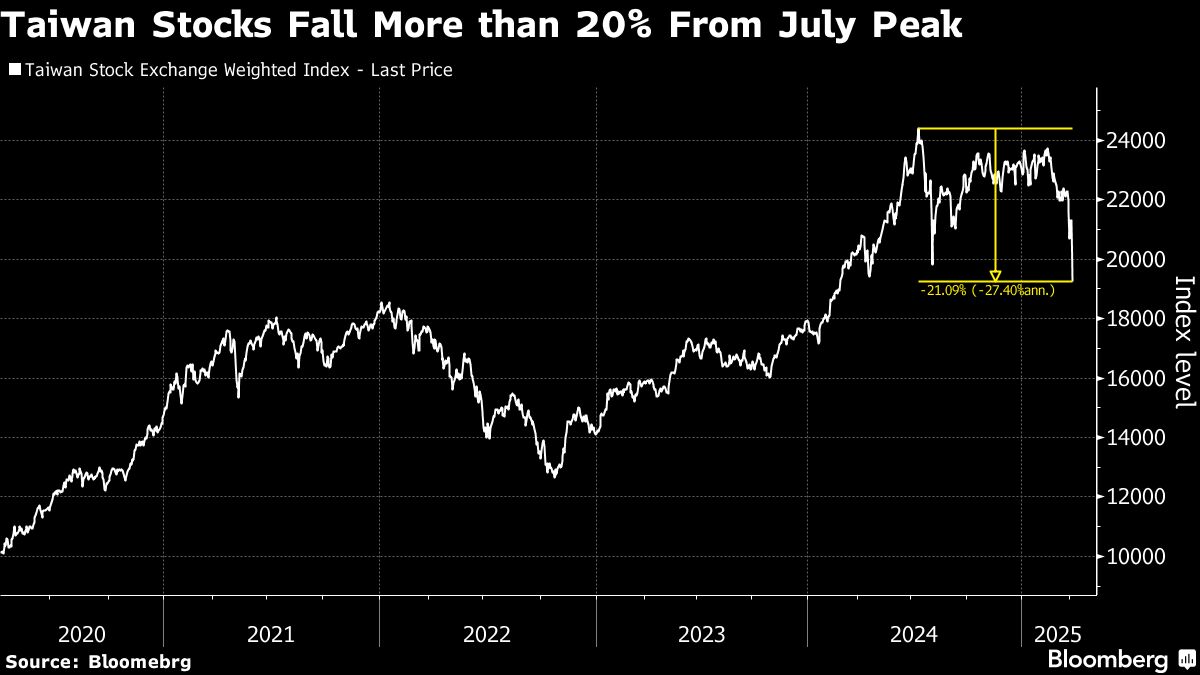
Taiwan's stock index tumbled the most on record, putting it on track for a bear market as trading resumed after a holiday, playing catchup to a global selloff triggered by President Donald Trump's tariff hikes.
The benchmark Taiex fell as much as 9.8% on Monday, taking its decline from a July peak to more than 20%. The drop after the US-imposed tariffs threaten to roil supply chains and slow growth. Taiwan Semiconductor Manufacturing Co., which has the top weighting in the index of greater than one-third, slid by the exchange's daily limit of 10%.
While levies targeted at semiconductor exports are excluded so far, the 32% tariff on Taiwan is among the highest in Asia and caught investors off guard. TSMC's US-traded shares slumped a total of 14% on Thursday and Friday when trading was closed in Taipei for a holiday, and China on Friday announced retaliatory tariffs on the US.
And it wasn't just TSMC. Virtually all of the Taiex's 1,000-plus components fell in Monday trading.

“Taiwan non-tech exporters will be more negatively impacted than tech related exporters, as reciprocal tariffs rates imposed on Asean and other emerging Asia countries such as Vietnam, Thailand and Malaysia surprised on the upside,” said Gary Tan, a portfolio manager at Allspring Global Investments.
The absence of chip tariffs limits direct risk to TSMC, Steven Tseng, senior technology analyst at Bloomberg Intelligence, wrote in a report, though he added that “rising prices under tariffs may suppress consumer demand, indirectly reducing orders for TSMC-manufactured chips.”
Concerns about geopolitical tensions and artificial-intelligence investments have weighed on the island's stocks this year, with the index underperforming MSCI's Asia Pacific gauge by about 8.5 percentage points as of Wednesday. Over the weekend, Goldman Sachs Group Inc. downgraded Taiwan equities to underweight, citing high exposure to US exports among other reasons.
Taiwan's financial regulator has sought to stem further fallout by tightening its rules on short-selling, which go into effect Monday. The new measures will increase margin requirements and limit securities lending and remain in effect through April 11.
Foreign investors dumped a record $13 billion of Taiwanese securities last month, dragging the local dollar 1.1% lower versus the greenback and making it Asia's the worst-performing currency. Taiwan's state-backed banks actively sold US dollars last week to smooth swings in the foreign-exchange market. Strategists at Bank of New York Mellon Corp. and Goldman Sachs expect the currency to continue weakening.
Essential Business Intelligence, Continuous LIVE TV, Sharp Market Insights, Practical Personal Finance Advice and Latest Stories — On NDTV Profit.























